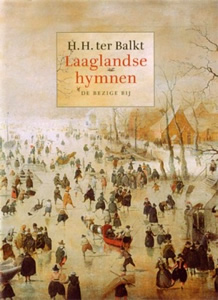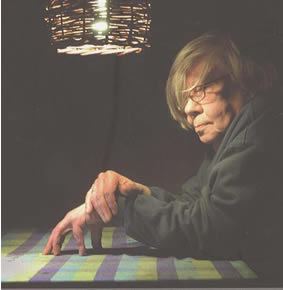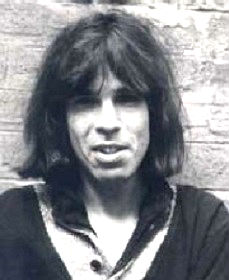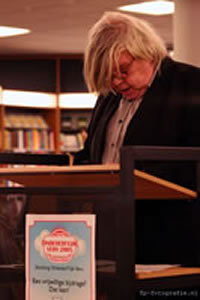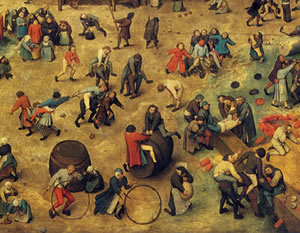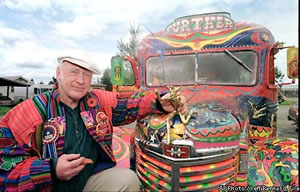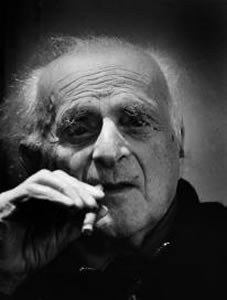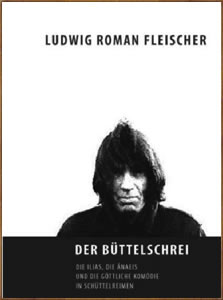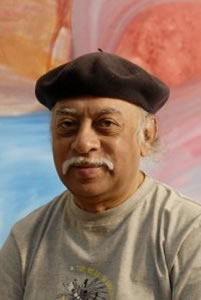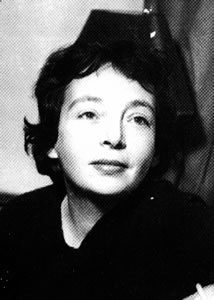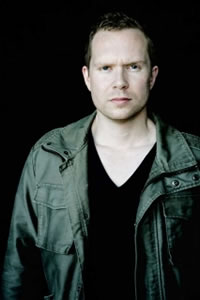De Nederlandse dichter H.H. (Herman Hendrik) ter Balkt werd geboren in Usselo op 17 september 1938. Zie ook alle tags voor H. H. Ter Balkt op dit blog.
Bezichtiging der landerijen
Aan Johan Egberink
Boekelo op twee mijlen van hier waar
oom Jan Tolstoj las achter de ploeg. Zijn zoon
rijdt ons over zijn landerijen;daar licht groen
naast de kalkovens der koeltanks het sein
op dat de constellatie verraadt van
de alerte apparatuur. Het kalfje
slobbert uit een emmer, uit de weiden loopt
op zijn gemak het vee de loopstal in.
De beekjes zijn er nog, één maïsakker en
dikbestoft de draaibank van mijn moeders
oud-oom: timmerman die in delirium
ten onder ging. Meimaan op de weiden, en
op het water in het grindgat. Hectaren
dicht aaneen. De frambozen, de boomgaard heen.
Rondeel
Oud gereedschap mensheid moe
zwierf door de zeeën en de landen
stem- en roemloos als kontrabande
oud gereedschap mensheid moe,
zonk onder voetstap en haaietanden
sloot nerf en handvat, handgreep toe
oud gereedschap mensheid moe
stierf toegetakeld onder stranden
onder velden, pleinen, onder toe-
gesloten ogen, schedels, handen
werd ingemetseld achter wanden
als Suster Bertken droef te moe,
oud gereedschap mensheid moe.
De eg
Een grote trom van anekdoten is de grond.
Eg aan de muur, die is daarvan ver weg.
Eg is ingescheept voor een reis die niet komt.
Mollenschrik; fetisj de opgehangen eg,
van de specie in de muur, van de stofruit
en de dakpan omlaagrollend naar de grond
Optekenaar, dronken van grond, geen egel
onnozele hals savonds drinkend uit de snelweg,
vluchtigheid van asfalt kleurend met tijd.
Het doet mij stilstaan te zien hoe hij
hangt of schommelt: een spotter
zoetjes rottend in het weer en de winden.
Hij schreef formules in de grond, halm
groeide dan hoog en groen tot je de grond
niet meer zag; eg. De grond was dan weg.
Nee geen tederheden, verbannen diepte.
Hang maar verga maar bedenk maar er
staan er meer tegen de muur, eg.
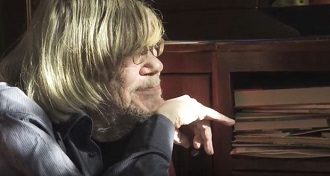
H.H. ter Balkt (17 september 1938 – 9 maart 2015)
De Nederlandse dichter, essayist en classicus Piet Gerbrandy werd geboren in Den Haag op 17 september 1958. Zie ook alle tags voor Piet Gerbrandy op dit blog.
In ruimten kruipen spinnen tussen buizen.
Ik wil het beest verslaan dat mij vergalt.
Tong slaat zich rauw op gril van elpen klippen.
Hoofd breekt zich over bron van lijfsbehoud.
Ik wil de pleisters van de goten rukken.
Het voorwerp dat mij stilt smeult in de hoek.
Blijmoedig wil ik wanhoop wijn inschenken.
Wat kan zal ooit en erger dan verwacht.
Ik wil ver heen mij nergens voort bewegen.
Ik zoek een bergzame plek om neer te zijgen.
Ik zal een feest begaan dat mij bevalt.
Drie muzen
I
Wij zitten, lui ter hand, op rug
van wijzen danig om ons heen
te denken.
Zo vinden wij de boomgrens
goed geregeld en waarderen
wij ontbreking van de dood.
Dat er de vrouw bestaat
met rondingen van zachtst
graniet, geen koude hoeken
van een zeer kristal, geen
snijdend erts, maar magma
zonder weerga, zint.
Ook dat zij vaak wel weet
waarom iets is.
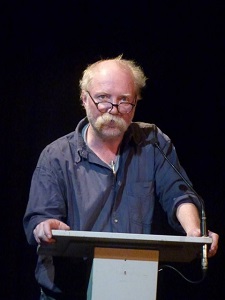
Piet Gerbrandy (Den Haag, 17 september 1958)
De Amerikaanse dichter William Carlos Williams werd geboren in Rutherford (New Jersey) op 17 september 1883. Zie ook alle tags voor William Carlos Williams op dit blog.
Kora In Hell: Improvisations I
1
Fools have big wombs. For the rest?—here is pennyroyal if one knows to use it. But time is only another liar, so go along the wall a little further: if blackberries prove bitter there’ll be mushrooms, fairy- ring mushrooms, in the grass, sweetest of all fungi.
2
For what it’s worth: Jacob Louslinger, white haired, stinking, dirty bearded, cross eyed, stammer tongued, broken voiced, bent backed, ball kneed, cave bellied, mucous faced—deathling,—found lying in the weeds “up there by the cemetery.” “Looks to me as if he d been bumming around the meadows for a couple of weeks.” Shoes twisted into incredible lilies: out at the toes, heels, tops, sides, soles. Meadow flower! ha, mallow! at last I have you. (Rot dead marigolds—an acre at a time! Gold, are you?) Ha, clouds will touch world’s edge and the great pink mallow stand singly in the wet, topping reeds and a closet full of clothes and good shoes and my-thirty-year’s-master’s-daughter’s two cows for me to care for and a winter room with a fire in it—. I would rather feed pigs in Moonachie and chew calamus root and break crab’s claws at an open fire: age’s lust loose!
3
Talk as you will, say: “No woman wants to bother with children in this country”;—speak of your Amsterdam and the whitest aprons and brightest doorknobs in Christendom. And I’ll answer you: “Gleaming doorknobs and scrubbed entries have heard the songs of the housemaids at sun-up and—housemaids are wishes. Whose? Ha! the dark canals are whistling, whistling for who will cross to the other side. If I remain with hands in pocket leaning upon my lamppost—why—I bring curses to a hag’s lips and her daughter on her arm knows better than I can tell you—best to blush and out with it than back beaten after.
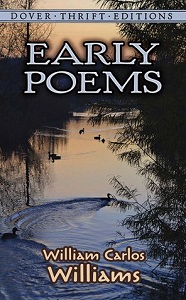
William Carlos Williams (17 september 1883 – 4 maart 1963)
Cover
De Amerikaanse schrijver Ken Kesey werd geboren in La Junta (Colorado) op 17 september 1935. Zie ook alle tags voor Ken Kesey op dit blog.
Uit: Sometimes a Great Notion
“Recalling this, and the wise doctor’s words, I relaxed my grip on the armrests and pulled the lever to recline the seat. Hell, I sighed, exiled even from the sanctuary of insanity. What a drag. Madness might have been a good way to explain terror and excuse anarchy, I mooned, a good whipping boy to blame in the event of mental discomfort, an interesting avocation to while away the long afternoon of life. What a crashing drag … But then … on the other hand, I decided, as the bus thundered slowly through town, you never can tell: it might have constituted as bad a drag as sanity. You would probably have to work too hard at it. And at times, almost certainly, a little sneak of memory would slip past your whipping boy and you would be whacked just as hard as ever by that joker’s bladder of reality, of pain and heartache and hassle and death. You might hide in some Freudian jungle most of your miserable life, baying at the moon and shouting curses at God, but at the end, right down there at the damned end when it counts … you would sure as anything clear up just enough to realize the moon you have spent so many years baying at is nothing but the light globe up there on the ceiling, and God is just something placed in your bureau drawer by the Gideon Society. Yes, I sighed again, in the long run insanity would be the same old cold-hearted drag of too solid flesh, too many slings and arrows, and too much outrageous fortune. I reclined my seat another notch and closed my eyes, trying to resign myself that there was nothing I could do about this runaway anarchy I had hold of but wait for the pharmaceutical pilot to come on and take over the controls and let me sleep. But the pills seemed uncommonly slow in coming on. And in this ten- or fifteen-minute wait—the billowing; the ringing; the bus, empty but for its solitary passenger in the back, huffing and whooshing through the town—before the barbiturates took effect … I was forced at last to consider those questions I had been skirting so skillfully. Like: “What in the shit you hope to accomplish running back home?” I knew that all that obscure Oedipal pap I had fed Peters about measuring up or pulling down might be approaching some kind of truth . . . but even if I were able to bring off one of these coups, what did I hope to accomplish? And like: “Why should one want to wake up dead anyway?’ If the glorious birth-to-death hassle is the only hassle we are ever to have . . . if our grand and exhilarating Fight of Life is such a tragically short little scrap anyway, compared to the eons of rounds before and after—then why should one want to relinquish even a few precious seconds of it? And—thirdly—like: “If it’s such a goddamned hassle—why fight it?”
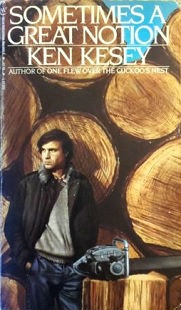
Ken Kesey (17 september 1935 – 10 november 2001)
Cover
De Nederlandse toneel- en kroniekschrijver en essayist Abel Herzberg werd geboren in Amsterdam op 17 september 1893. Zie ook alle tags voor Abel Herzberg op dit blog.
Uit: Meat and vegetables
“Matzes: Iedereen weet, dat de Joden aan de vooravond van hun Paasfeest de seideravond vieren, die veel, veel ouder is dan de weg naar Rome. In de christelijke overlevering is de seideravond bewaard gebleven als het heilige avondmaal en uiteraard volledig van inhoud veranderd. Er zit namelijk buitengewoon weinig heiligs in de seideravond, het is bijna allemaal profaan wat de klok slaat. Men werpe mij nu niet tegen, dat de seideravond een godsdienstig gebruik is. Want afgezien daarvan, dat men erover kan twisten wat onder ‘heiligheid’ in de Joodse godsdienst moet worden verstaan, wijst het opheffen of het sublimeren van materiële, historische feiten tot religieuze gebruiken, niet op het belang der religie, maar op dat van die feiten. En op de seideravond wordt niets anders dan een materieel, historisch feit herdacht, te weten de uittocht uit Egypte, de afwerping der slavernij, de geboorte der nationale zelfstandigheid, kortom, zo iets als de oorlog 1940-1945. De vrome mensen zeggen, dat dit door de hand van God is geschied, maar ook als men dit erkent, belet dat niemand om in te zien dat het het wereldse, het politieke gebeuren geweest is, hetwelk diepe en blijvende indruk gemaakt heeft.
Het jongste kind van het gezin stelt op seideravond de beroemde vier vragen naar de betekenis van het ritueel, dat het daar voor zich ziet. De eerste vraag betreft de betekenis van de matzes.
De vader geeft antwoord. Hij toont de matzes, die hij voor zich heeft liggen, en zegt: ‘Dit is het brood der ellende, dat onze voorouders hebben gegeten bij hun uittocht uit het land, waar zij door Pharao werden onderdrukt’. En hij vertelt, hoe dat zich heeft toegedragen, hoe er bij die uittocht geen tijd was om het brood te doen rijzen, en hoe die voorouders toen ongegist of ongezuurd brood hebben gegeten. Waaraan hij toevoegt: ‘Niet één geslacht is uitgetrokken, maar van geslacht tot geslacht moet ieder zich beschouwen als ware hij zelf slaaf in Egypte geweest, en als ware hij zelf bevrijd’. De kinderen luisteren en ondergaan de gebeurtenis (zij zal zich vijf en dertig eeuwen geleden hebben afgespeeld) als hun eigen actualiteit.”
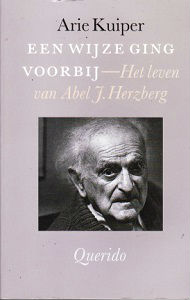
Abel Herzberg (17 september 1893 – Amsterdam, 19 mei 1989)
Cover biografie
De Indiase dichter, schrijver, schilder en regisseur Dilip Purushottam Chitre werd geboren op 17 september 1938 in Baroda. Zie ook alle tags voor Dilip Chitre op dit blog.
The Felling of the Banyan Tree
My father told the tenants to leave
Who lived on the houses surrounding our house on the hill
One by one the structures were demolished
Only our own house remained and the trees
Trees are sacred my grandmother used to say
Felling them is a crime but he massacred them all
The sheoga, the oudumber, the neem were all cut down
But the huge banyan tree stood like a problem
Whose roots lay deeper than all our lives
My father ordered it to be removed
The banyan tree was three times as tall as our house
Its trunk had a circumference of fifty feet
Its scraggy aerial roots fell to the ground
From thirty feet or more so first they cut the branches
Sawing them off for seven days and the heap was huge
Insects and birds began to leave the tree
And then they came to its massive trunk
Fifty men with axes chopped and chopped
The great tree revealed its rings of two hundred years
We watched in terror and fascination this slaughter
As a raw mythology revealed to us its age
Soon afterwards we left Baroda, for Bombay
Where there are no trees except the one
Which grows and seethes in one’s dreams, its aerial roots
Looking for the ground to strike.
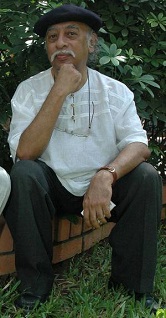
Dilip Chitre (17 september 1938 – 10 december 2009)
De Oostenrijkse dichter en schrijver Ludwig Roman Fleischer werd geboren op 17 september 1952 in Wenen. Zie ook alle tags voor Ludwig Fleischer op dit blog.
Uit: Nichts als die Wahrheit
„Mit den Kneipensperrstunden in engem und wertvollem Zusammenhang steht das Jugendschutzgesetz, welches Jugendliche am Alkoholgenuss in der Öffentlichkeit hinde
rt. In fast allen Kneipen müssen junge oder jung wirkende Menschen ihre identity card bei sich haben und vorweisen. Nur, wenn aus derselben hervorgeht, dass man zumindest achtzehn Jahre alt ist, darf man ein Bier trinken. Viele Bars und Pubs haben das Alkoholschutzalter auf zwanzig, einige sogar auf dreiundzwanzig Jahre angehoben. Wer nicht wenigstens wie Vierzig aussieht, muss sich ausweisen, selbst, wenn er bereits drei akademische Grade erworben oder den Nobelpreis für Chemie erhalten hat. Englische Jugendliche betrinken sich zu Hause bei ihren mit ihnen überforderten Eltern, im dormitory ihrer private school, in den Parks oder Fußballstadien.
Es gibt Restaurants, in denen aus nicht näher bekannten Gründen – regulations nennt sie der Besitzer üblicherweise – kein Alkohol ausgeschenkt werden darf. Es ist dem Gast allerdings freigestellt, die eine oder andere Flasche Wein ins Lokal mitzunehmen; gern werden ihm Wirt oder Wirtin einen Korkenzieher und ein Weinglas zur Verfügung stellen. In Anbetracht der britischen Kochkunst ist es angenehmerweise ziemlich gleichgültig, ob man zum Lamm in Pfefferminzsauce, den Schweinswürsten mit Erdäpfelmatsch, der Pizza mit Pommes Frites oder den Ravioli auf versengten Toastscheiben Blauburgunder, Tee, Coca Cola oder Hustensaft trinkt.
Es sind aber noch zahllose andere regulations in Kraft, die Ordnung in den englischen Alltag bringen: Zum Beispiel das queuing-up system auf Postämtern, Banken, Reise- und Versicherungsbüros. Die hinter Panzerglas verschanzten und mit Mikrophonen ausgestatteten Bediensteten haben ein wachsames Auge für Verstöße gegen Schlangenstandregeln und verweigern jedem, der sich nicht angestellt hat – weil er zum Beispiel der einzige Kunde ist – unweigerlich die erheischte Dienstleistung. Schlange zu stehen hat man auch bei Bushaltestellen, Fahrkartenschaltern und Theatertageskassen, wobei jede dieser Institutionen ihr eigenes queuing-up system vorschreibt.“
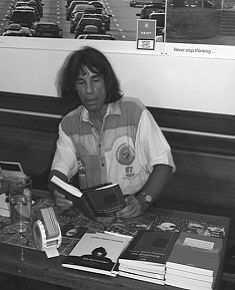
Ludwig Roman Fleischer (Wenen, 17 september 1952)
De Franse dichteres en schrijfster Albertine Sarrazin werd geboren op 17 september 1937 in Allgiers. Zie ook alle tags voor Albertine Sarrazin op dit blog/
Verona Lovers
Sur les frais oreillers de marbre ciselé
Où fane un lours feston de corolles savantes
Se confondent sans fin les amants aux amantes
Qui se sont fait mourir du verbe ensorcelé
Avares du vieillir ô vous enviez-les
D’avoir sur le tremplin des extases silentes
Laissé ce million de minutes naissantes
Et bien royalement le monde tel qu’il est
Cette nuit-là comme il s’aimèrent sans mensonge
Quelque pouce géant dans sa toute bonté
A fait rouler leurs yeux hors des coffres du songe
Cependant que très loin sur les terres bénies
Les violons têtus enchantaient les Asies
Et riaient de tendresse leurs divinités
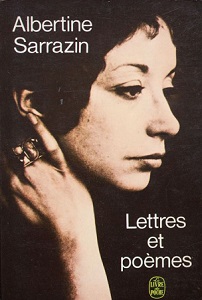
Albertine Sarrazin (17 september 1937 – 10 juli 1967)
Cover
De Engelse dichteres schrijfster Mary Stewart werd geboren op 17 september 1916 in Sunderland. Zie ook alle tags voor Mary Stewart op dit blog.
Uit: The Moonspinners
“Did you ever hear the legend of the moonspinners?’
‘The what?’
‘Moonspinners. They’re naiads — you know, water-nymphs. Sometimes, when you’re deep in the countryside, you meet three girls, walking along the hill tracks in the dusk, spinning. They each have a spindle, and onto these they are spinning their wool, milk-white, like the moonlight. In fact, it is the moonlight, the moon itself, which is why they don’t carry a distaff. They’re not Fates, or anything terrible; they don’t affect the lives of men; all they have to do is to see that the world gets its hours of darkness, and they do this by spinning the moon down out of the sky. Night after night, you can see the moon getting less and less, the ball of light waning, while it grows on the spindles of the maidens. Then, at length, the moon is gone, and the world has darkness, and rest, and the creatures of the hillsides are safe from the hunter and the tides are still . . .’
Mark’s body had slackened against me, and his breathing came more deeply. I made my voice as soft and monotonous as I could.
‘Then, on the darkest night, the maidens take their spindles down to the sea, to wash their wool. And the wool slips from the spindles, into the water, and unravels in long ripples of light from the shore to the horizon, and there is the moon again, rising from the sea, just a thin curved thread, reappearing in the sky. Only when all the wool is washed, and wound again into a white ball in the sky, can the moonspinners start their work once more, to make the night safe for hunted things . . .’
Beyond the entrance of the hut, the moonlight was faint, a mere grayness, a lifting of the dark… not enough for prying eyes to see the place where Mark and I lay, close together, in the dark little hut. The moonspinners were there, out on the track, walking the mountains of Crete, making the night safe, spinning the light away.”
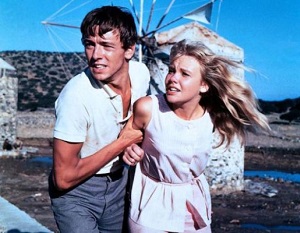
Mary Stewart (17 september 1916 – 9 mei 2014)
Scene uit de gelijknamige film uit 1964

